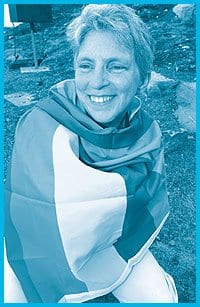On the tundra, near the frigid river that runs along the remote city of Iqaluit on Baffin Island, a small group of gays, lesbians, bisexuals and their supporters celebrated Canada’s coldest and most northerly Gay Pride event.
Unlike other capital cities where people ring in Pride with large, flamboyant parades through the streets, the Jun 15 celebration in Iqaluit, Nunavut was more of a quiet close-knit picnic on the treeless, barren tundra.
For the third year running, gays and lesbians celebrated Gay Pride with a music jam session, games and a picnic near the char-filled river in Iqaluit, which means “place of many fish” in the Inuit language.
Iqaluit’s Pride event isn’t the typical high-charged political gathering seen in southern Canada. It tends to be more of a social event where homosexuals, flanked by their family, friends or supporters, celebrate their sexuality.
But this year’s event packed a little more political punch than the previous Pride picnics.
Svend Robinson, the first openly gay Member of Parliament and a strong supporter of gay rights legislation, traveled to Iqaluit to take part in the city’s Pride picnic.
Robinson is a friend of one of the Iqaluit Pride organizers, Allison Brewer. Both of them attended the Pride parade last year in Moncton, NB and Brewer pitched the idea to Robinson that he come to the Iqaluit celebration the following year.
“He said he’d love to come up,” Brewer, a lesbian activist who lives in Iqaluit, recalls. Capital Xtra was unable to contact Robinson for comments.
Robinson was certainly high profile this year on the gay rights’ front. He spent a lot of time lobbying Parliament to amend the Criminal Code to add “sexual orientation” to the list of grounds under hate propaganda legislation.
“This year there’s more attention leading up to the event,” Brewer, a mother of three teenagers, says in an interview prior to the picnic.
That’s because Iqaluit’s Pride celebration followed closely on the heels of major discussions – and sometimes hot debates – on gay rights in the territory.
One such debate focused on the issue of same-sex marriages. In late April the Standing Committee on Justice and Human Rights, a group of MPs that travelled across Canada to gather opinions on same-sex marriages, held a hearing in Iqaluit. There, some local people and organizations expressed fundamentalist Christian ideas, stressing the importance of procreation and family.
A second debate centered on the creation of new human rights legislation for Nunavut. The proposed law would cover the commonly accepted grounds for protection, such as race, religion, age, disability, sex and sexual orientation. But it doesn’t include gender identity. Whether the government should include this or not stirred up some debate.
Still, Brewer likes to focus more on the positive comments and the support Iqaluit residents expressed on the issues. At the hearing on same-sex marriage, for instance, Brewer was especially touched by an Inuit elder who described the wonderful job two gay men are doing in raising her grandson.
While people tend to think Inuit are staunchly opposed to homosexuality or are homophobic, Brewer has a different perspective – a much more positive one.
“I don’t see it as rampant here,” she says. “The views of Inuit seem to reflect the views of all Canadians. There are some who support it and some who are against it.”
The Pride event itself is about celebrating that support, Brewer says.
With average temperatures in June hitting merely seven degrees and Iqaluit located north of 60, the city’s Pride event is likely Canada’s chilliest. “It was so cold. I guess we had the coldest and most northerly Pride event that year,” Brewer recalls about the first Pride Picnic, held in 2001. Brewer, who had moved to Iqaluit that year from Fredericton, helped initiate the city’s inaugural Pride celebration.
The idea sprang from a conversation she and a handful of friends had over some beers. “I guess we felt that just because we lived in the Arctic didn’t mean we should be left out of Pride celebrations. If other cities in Canada were doing it, so could we,” says Brewer.
The first was advertised solely through word of mouth. The next year, the organizers e-mailed invitations to friends and family members. That year, the picnic also took on a broader focus – it wasn’t simply for gay and lesbians, but for their supporters as well. “Iqaluit Pride Picnic” became “Iqaluit Pride and Friends of Pride Picnic,” a real turning point for the event.
Still, the Pride event isn’t drawing large numbers of Inuit. For the most part, it’s the non-Inuit who come out to celebrate. “Unfortunately for the Inuit it is still an unsafe event for them to come out to,” Brewer explains. “What we hope to achieve with this is to raise public awareness and take the stigma out of being lesbian or gay in Nunavut.”

 Why you can trust Xtra
Why you can trust Xtra


